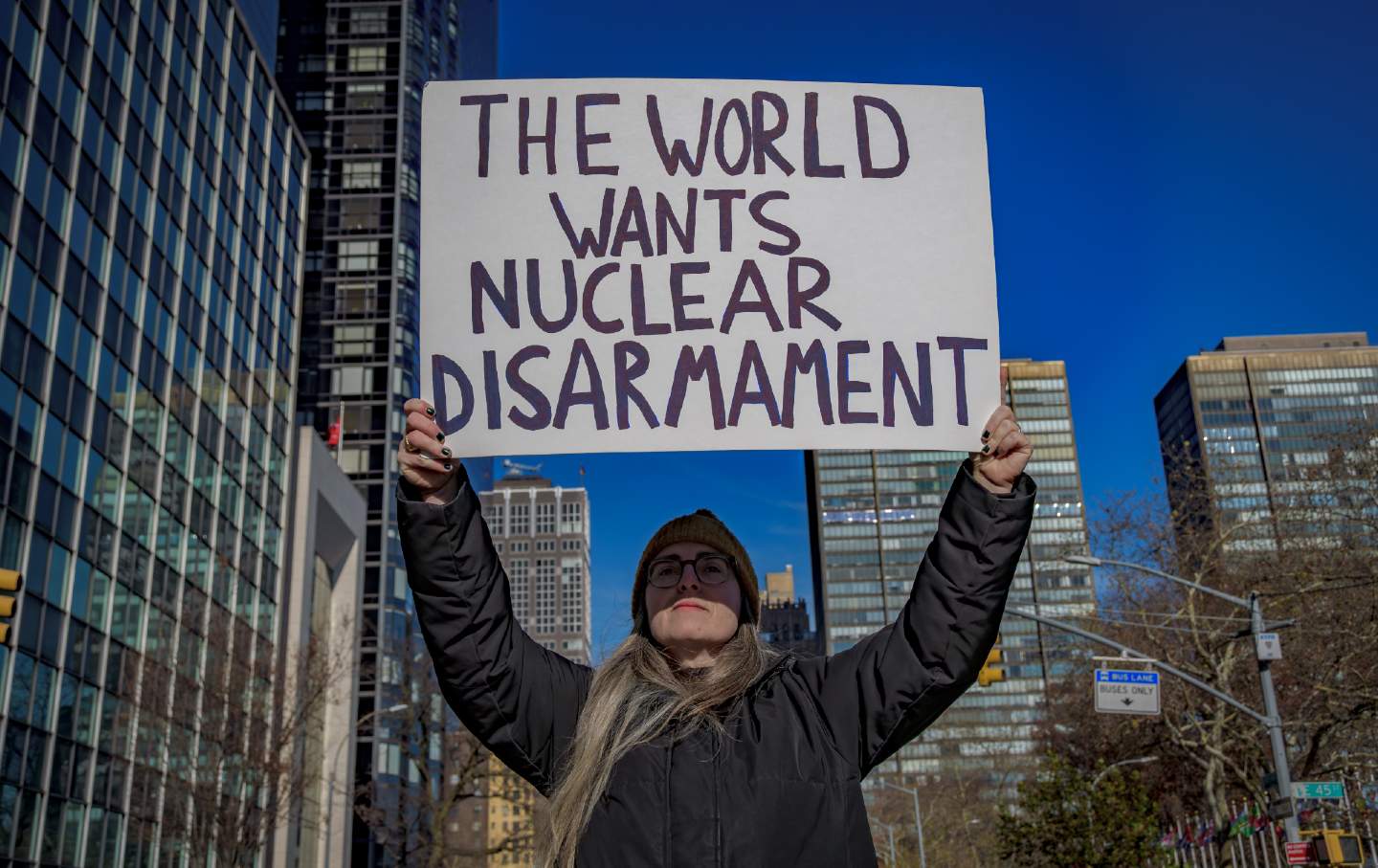Will Israel Drag the US Into Another Ruinous War?
President Biden refuses to pursue the most obvious way of de-escalating tensions and avoid American deaths: a cease-fire in Gaza.

An Israeli drone struck a Hamas office as smoke rises in Beirut, Lebanon, on January 2, 2024. Lebanese Prime Minister Najib Mikati has declared the Beirut explosion to be a “new Israeli crime” with the alleged intention of pushing Lebanon into a fresh phase of confrontations.
(Houssam Shbaro / Anadolu via Getty Images)America and Israel’s interests have never been fully aligned on Gaza. But as Israel’s bombardment of the narrow strip has continued for almost 100 days, the Netanyahu government is shifting in a direction that directly threatens the stated goals of the Biden administration: Israel wants to expand the war into Lebanon and appears to welcome open warfare against so-called Axis of Resistance—Hezbollah in Lebanon, the Houthis in Yemen, and the revolutionary government in Iran. The assassination of Hamas deputy leader Saleh al-Arouri in Beirut yesterday makes that clear. So far, President Joe Biden has refused the one step that can prevent both this escalation and the US from getting dragged into yet another war in the Middle East: a cease-fire in Gaza.
Since October 7, the assumption of the White House’s strategy was that in order to have credibility with Israel, Biden must first show unconditional support. Only then, the logic goes, will he have the leverage to rein in Israel. This reasoning allows the possibility that Biden wanted a cease-fire but had to earn credibility before he could press Israel. And that pressure would of course only be applied privately. Before the cameras, there would be no daylight between Biden and Israeli Prime Minister Benjamin Netanyahu.
But as the war has progressed and more than 22,000 Palestinians have been killed—almost half of them children—with weapons that Biden provided, the image of an American president that wants a cease-fire but is stumbling to find the leverage to force an end to fighting has fallen apart. Biden has shipped more than 10,000 tons of weapons and ammunition to Israel, twice sidestepped congressional oversight to expedite the arms transfers, twice vetoed resolutions at the UN Security Council calling for a cease-fire, and even studied how to permanently transfer 2.3 million Palestinians from Gaza to the desert in the Sinai. While Biden has condemned Israeli cabinet ministers when they openly speak of their plans of ethnic cleansing, it has become increasingly clear that he’s never wanted a cease-fire, because he has bought into the feasibility and legitimacy of Israel’s maximalist war objective: the complete military destruction of Hamas, come what may. Biden wants Israel to do to Hamas what the US couldn’t do to the Taliban.
Of course, there was never a need to build credibility to pressure Netanyahu. The United States already had massive credibility with Israel, particularly after Biden openly contemplated offering Saudi Arabia a defense pact and access to the nuclear fuel cycle if it normalized relations with Israel. No other American president had ever given such concessions to Israel’s Arab rivals to secure an agreement for Israel. Even Trump, who began the normalization campaign that explicitly sought to “move beyond the Palestinian issue,” never offered defense pacts to the four Arab countries he brought into the so-called Abraham Accords.
The other myth propagated by the Washington foreign-policy establishment to excuse Biden’s inaction in face of what the South African government convincingly asserts is a genocide also disintegrates with a closer look: The United States, some D.C. analysts conveniently argue, simply does not have leverage to stop Israel. History suggests otherwise.
In 1982, President Ronald Regan was “disgusted” by Israeli bombardment of Lebanon. He stopped the transfer of cluster munitions to Israel and told Israeli Prime Minister Menachem Begin in a phone call that “this is a holocaust.” Reagan demanded that Israel withdraw its troops from Lebanon. Begin caved. Twenty minutes after their phone call, Begin ordered a halt on attacks.
Indeed, it is absurd to claim that Biden has no leverage, particularly given the massive amounts of arms he has shipped to Israel. In fact, Israeli officials openly admit it. “All of our missiles, the ammunition, the precision-guided bombs, all the airplanes and bombs, it’s all from the US,” retired Israeli Maj. Gen. Yitzhak Brick conceded in November of last year. “The minute they turn off the tap, you can’t keep fighting. You have no capability.… Everyone understands that we can’t fight this war without the United States. Period.”
But Israel cannot destroy Hamas militarily, just as the United States couldn’t rely on military-only solutions to defeat the Taliban in Afghanistan. Former Israeli prime minister Ehud Olmert admitted as much just last month.d “The odds of achieving the complete elimination of Hamas were nil from the moment that Prime Minister Benjamin Netanyahu declared them to be the chief goal of the war,” he wrote in Haaretz at the end of December.
Instead, Israel appears to be taking advantage of Biden’s near-total deference to Netanyahu to do what previous American presidents have prevented Israel from doing—drag the US into a regional war with Iran and its allies. Another former Israeli prime minister, Naftali Bennett, argued in The Wall Street Journal only a week ago that “the U.S. and Israel need to take Iran on directly.”
There is little doubt that war with Iran, Hezbollah, and the Houthis would be ruinous for the region and for the United States. Though Biden opposes a widening of the war, he has been nonchalant about the risk of escalation.
That risks exists on four fronts: between Israel and the Lebanese Hezbollah, in Syria and Iraq due to attacks on US troops by militias aligned with Iran, the Red Sea between the Houthis and the US Navy, and between Israel and Iran following both the assassination of an Iranian general in Syria and the explosion in Kerman today at the commemoration of the death of General Qassem Soleimani that has killed more than 100. (It remains unclear whether Israel played a role in that attack, but it has nonetheless increased tensions in the region.)
Popular
“swipe left below to view more authors”Swipe →Increased attacks on US troops are directly linked to Israel’s war in Gaza. Between January 2021 and March 2023, Iraqi militias targeted US personnel around 80 times. Since October 7, 2023, however, more than 100 such attacks have been conducted.
While Biden has sought to deter Iran and its allies by moving more US troops and ships to the region, he has refused to pursue the most obvious and effective way of de-escalating tensions and putting American troops out of harm’s way: a cease-fire in Gaza.
Indeed, during the six days in November that a cease-fire was in place, attacks by Iraqi militias on US troops stopped. Only a day before the cease-fire, the militias targeted the US in six separate attacks. The Houthis also dramatically decreased their targeting of ships in the Red Sea during the cease-fire. Still, Biden refuses to budge. If the question earlier was how many innocent Palestinians would have to die before Biden would come to his senses and finally demand a cease-fire, the question may soon become how many Americans must die before he musters the courage to say no to Israel.
Dear reader,
I hope you enjoyed the article you just read. It’s just one of the many deeply-reported and boundary-pushing stories we publish everyday at The Nation. In a time of continued erosion of our fundamental rights and urgent global struggles for peace, independent journalism is now more vital than ever.
As a Nation reader, you are likely an engaged progressive who is passionate about bold ideas. I know I can count on you to help sustain our mission-driven journalism.
This month, we’re kicking off an ambitious Summer Fundraising Campaign with the goal of raising $15,000. With your support, we can continue to produce the hard-hitting journalism you rely on to cut through the noise of conservative, corporate media. Please, donate today.
A better world is out there—and we need your support to reach it.
Onwards,
Katrina vanden Heuvel
Editorial Director and Publisher, The Nation

More from The Nation

Israel’s Legal Reckoning and the Historical Shift in Justice for Palestinians Israel’s Legal Reckoning and the Historical Shift in Justice for Palestinians
Global courts challenge Israeli action in Gaza.

What Is at Stake as the European Union Swings Right? What Is at Stake as the European Union Swings Right?
The right’s normalization moves ahead.

The Perils of Wider War in Eastern Europe The Perils of Wider War in Eastern Europe
We face a choice between a negotiated settlement in Ukraine and the possibility of a catastrophic war.
Editorial / Katrina vanden Heuvel, James Carden for The Nation

A New Chinese Exclusion Act A New Chinese Exclusion Act
Demonizing China allows Republicans to unite around an authoritarian agenda at home—and provides a convenient rationale for unfettered Pentagon profiteering.

The Israeli Injustice Complex The Israeli Injustice Complex
How the military courts serve as one of Israel’s most effective and secretive weapons.

A Just-Released Watchdog Report Makes the Case for Eliminating Land-Based Nuclear Missiles A Just-Released Watchdog Report Makes the Case for Eliminating Land-Based Nuclear Missiles
Land-based missiles are redundant and dangerous.


